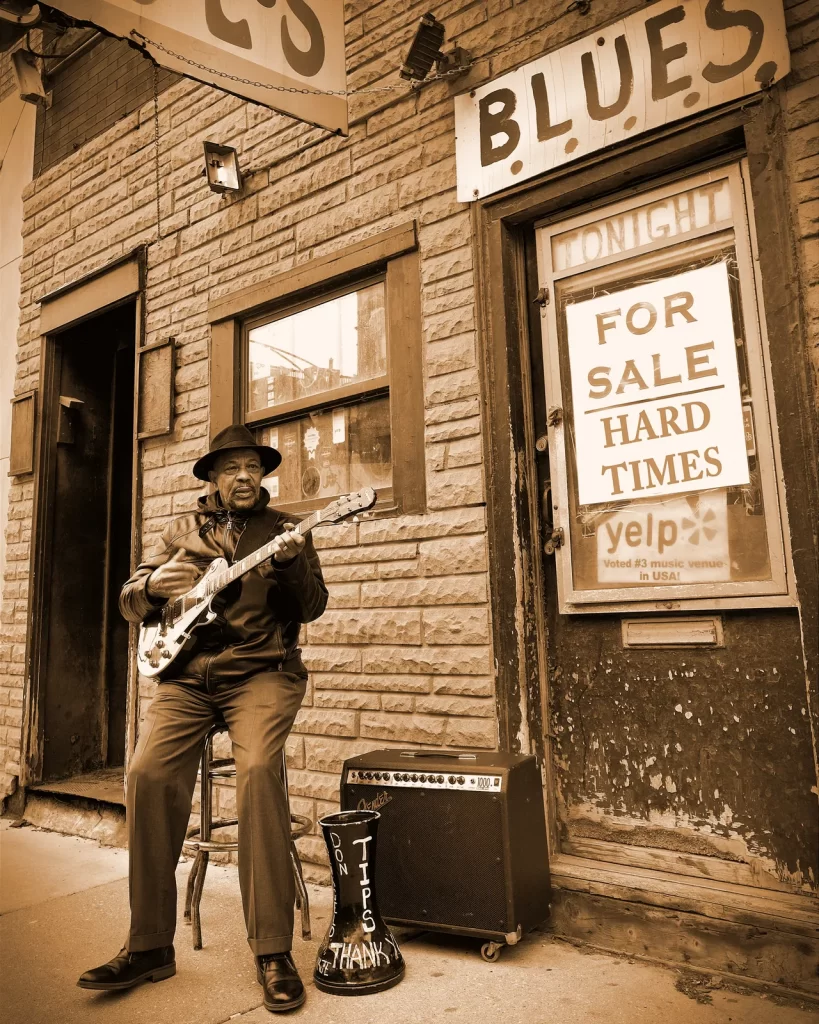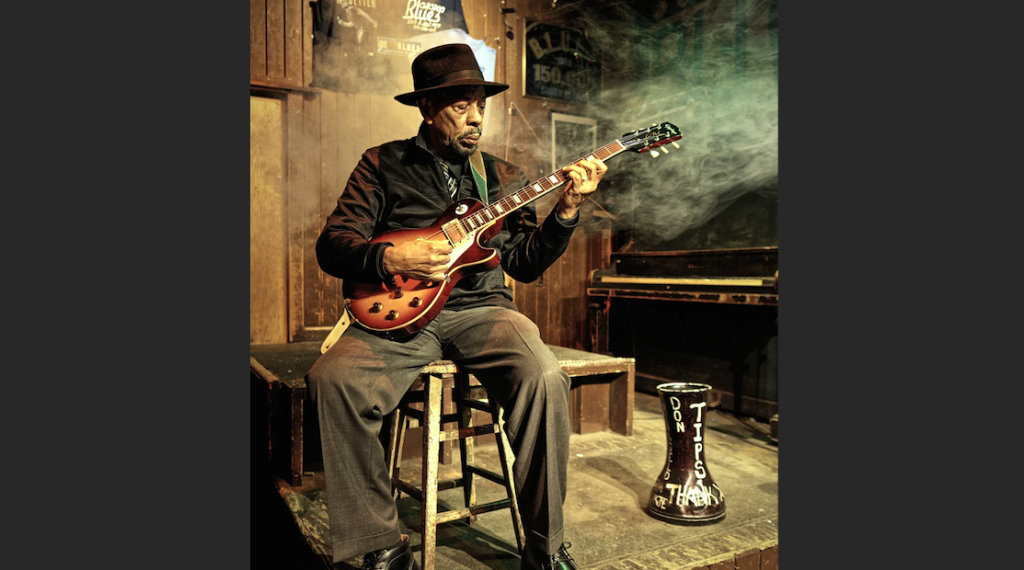One of blues legacy guitarist John Primer’s recent albums is called Hard Times recorded with The Real Deal Blues Band. The title cut of all originals includes the lyric:
Hard times and trouble
Won’t somebody tell me
When hard times ever end
Hard times indeed!
His father was killed when John was three. He was brought up by his grandmother and as a child worked the Mississippi cotton fields from sun up to sundown, never seeing a full day of school unless it was raining.
“Well, as a young kid, I went through a lot of problems and stuff like that. It’s tough to grow up without a dad. My mom left when I was about six years old. She went to Chicago. It was a struggle to me. It was tough times picking cotton in the fields. I was going to school off and on. Couldn’t go a full day, half a day. After that, I went until I was 12 years old, and then full days. Unless it rained, you went a full day, sun up to sundown picking cotton.
“That’s the way it was for sharecroppers. I didn’t plant cotton. All the men got together and planted all the cotton. You picked two or three bales of cotton a week. They’d take it to the cotton gin. You’d pick two or three bales of cotton and get seven bucks. Seven bucks was pretty good. Everything was cheap back then.”

Like Buddy Guy, his first “guitar” was a single wire strand nailed to his house that had no running water, no electricity, and no bathroom. His slide was an empty vanilla bottle.
“I started off when I was real young, two or three years old. I was playing a diddley bow upside of my grandmother’s house. I used to play that thing all the time. Sing and play, you know?”
His cousin would nail a wire from a broom up against the wall of his shack and John would pluck that wire. “I couldn’t build one of those things myself. As I got older, five or six years old, I’d build my own. But at two or three years old, you couldn’t hammer those nails in the house.
“My cousin Mark and them probably before I was born had it upside the house. After I was three or four years old, they’d go into the field ’cause I’d watch them play. I’d go out and play, pick on that thing myself. Wasn’t no slide. A small flavor bottle empty. A flavor bottle, empty flavor bottle called vanilla. I wish I had one of those bottles now.
“You put it on your finger and put your hand into it. You held it with your whole hand, and you hit it with. up and down, slide up and down (Do da da, do dat do) I don’t know what tune it was on. I always wanted a (real) guitar because the magazine came from Chicago, Sears Roebuck. I’d go to the mailbox and get it out the mailbox and turn right to the page with the guitars and stare at the guitars. That was it. Yeah, I ordered it. I don’t know what name it was.”
He moved to Chicago at age 18 and was surprised to find the legacies that inspired his guitar playing were still alive. He ended up playing with many of them, including Muddy Waters from 1980 until Muddy’s passing in ’83. The list also includes: The Rolling Stones, Big Mama Thornton, James Cotton, Magic Slim & The Teardrops, Billy Boy Arnold, Billy Branch, Lurrie Bell, Valerie Wellington, A.C. Reed, Tail Dragger, Big Jack Johnson, Louis Myers, Eddie Shaw, Willie Kent, Smokey Smothers, Hubert Sumlin, Jimmy Rogers, Phil Guy, and Mississippi Heat.
He remembers Muddy Waters’ guitarist Sammy Lawhorn introducing him to Theresa’s Lounge at 4801 South Indiana on the South Side around 1976. “Junior Wells played there regularly with Sammy Lawhorn.”
Wells was later joined by bluesman Byther Smith, as well as local and touring bands, including Muddy Waters, Little Walter, Otis Rush, Earl Hooker, Otis Spann, Jimmy Rogers, and Howlin’ Wolf. One journalist described the place: “Behind the bar hung Christmas lights all year round, and if your gun happened to slip out of your pocket the night before, you’d be likely to find it in the Lost & Found at Theresa’s the next night.”
John remembers, “Sammy was playing there with John Watkin who played with Willie Dixon. He was the house band for Theresa’s. So, when I got there, he told me the next week was Jr. Wells. When I got there, the band went on break. He says, ‘I know this guy Watkin.’
“Theresa said, ‘I just didn’t want you playing no rock and roll. I told you about playing that shit in my place.’ In her club she didn’t want them playing popular music that was on the hit parade at the time. Watkin used to play it all the time. He played all kinds of music, top 10, all that stuff. I’m sure he played it down there.
“So, Monday, I came down there and Junior was playing, and I said, ‘John Walkin said to come down here and play in his place.’ And Junior said, ‘I don’t care.’ That’s all he said. I worked there seven nights for seven years.”
Theresa may not have liked her bands playing popular music, but she had a special place in her heart for one George Jones country song, especially the way John Primer sang it.
“I played rhythm guitar, and then I started singing ‘He Stopped Loving Her Today.’ I think Theresa must have loved that song. I was singing it. She came back there with her hand in her apron. I thought she was gonna shoot me. She went into her apron, came out with a 10-dollar bill and said, ‘Here, motherfucker. I didn’t know you could sing.’ She told the bartender, ‘Give this motherfucker anything he wants to drink.’”
John has released scores of releases in 32 years, the best being The Real Deal for Atlantic’s British imprint Code Blue produced by the great but under-recognized Mike Vernon in 1995. That LP included Billy Branch on harp and the late David Maxwell on keyboards. Another standout is Knocking on Your Door for Telarc from 2000 including Mathew Skoller on harp, Larry McKray on second guitar, and Mike Vernon on percussion.
He’s also recorded for Michael Franks’ Chicago label Earwig and the Wolf Records where he made his solo recording debut in 1991 with Poor Man’s Blues for the Austria-based label that was also Magic Slim’s longtime home. He began his own label Blues House Productions in 2008. His two most recent albums on Blues House are Hard Times released in 2022 and this year’s Teardrops for Magic Slim, the best works of his career.
At 78 years old, he still plays the Chicago blues clubs like The Kingston Mines that doesn’t get him home until 5 in the morning, and Rosa’s where he recorded Teardrops for Magic Slim. “I work there pretty often. I don’t work Blue Chicago very often, but it’s not hard work. We do three songs. Then we call the female up to sing the rest of the show. It ain’t but an hour show. We play three hours. Then take a break. But I only do three songs each show.”
John has lived in Chicago now for 60 years. “When I came to Chicago, I thought (the Chicago blues masters) had all passed away. I didn’t find out they were all alive until I came to Chicago. We didn’t know too much about blues. We didn’t have any of that stuff in school.”
Hard times and trouble
Just won’t let me be
Hard times and trouble
Please leave me alone
Well, if I don’t find me a job
I will soon lose my happy home
Following his Friday, October 6th performance at the King Biscuit Blues Festival in Helena, Arkansas, John Primer will be my guest at the 11th annual Call and Response Seminar on Saturday in the Malco Theater on Cherry St. He will be joined by Nick Moss, Dennis Gruenling, and Festival CEO Munnie Jordan.
Other upcoming appearances include:
Thursday, September 14 – Bourbon and Beyond Festival – Kentucky Exposition Center, Louisville, KY, USA
Wednesday, September 27 – Jimmy’s Jazz & Blues Club, Portsmouth, NH, USA
Friday, September 28 – The Linda WAMC’s Performing Arts Studio Albany, NY


